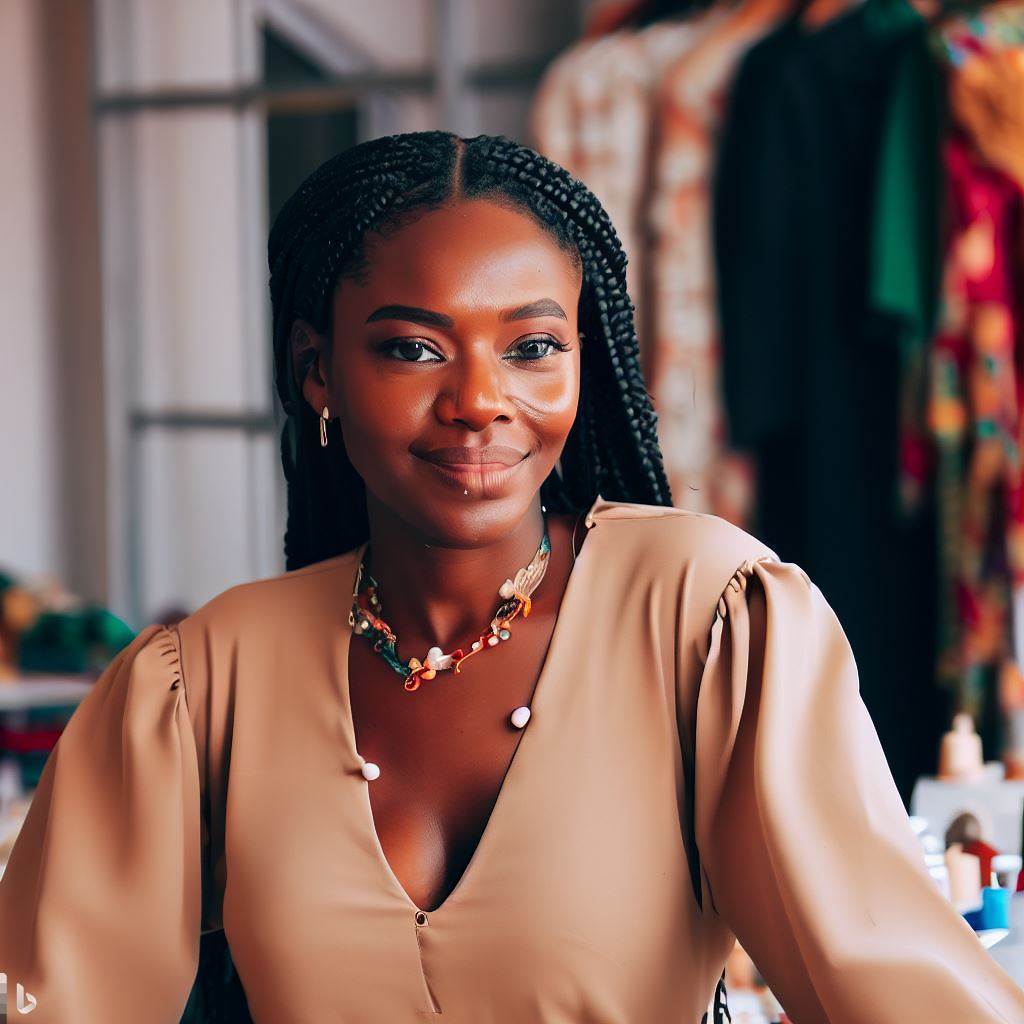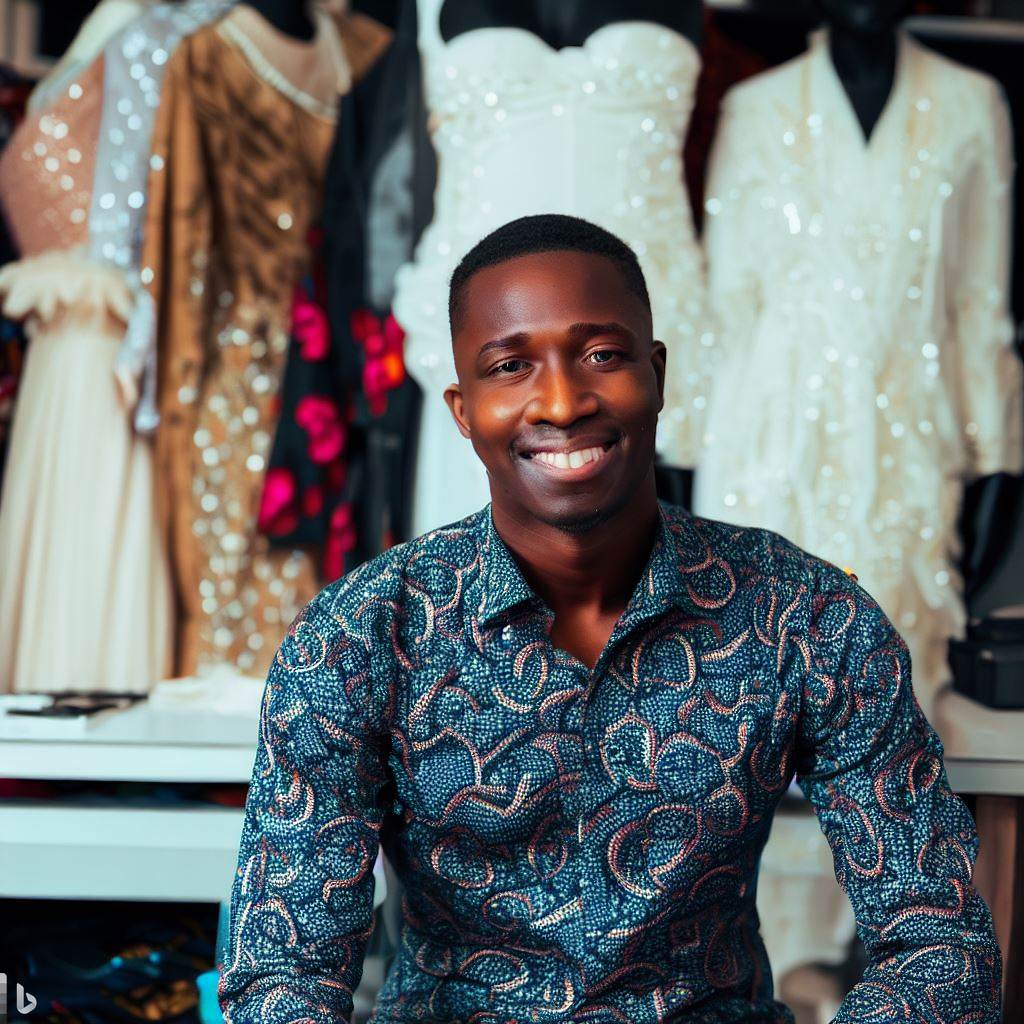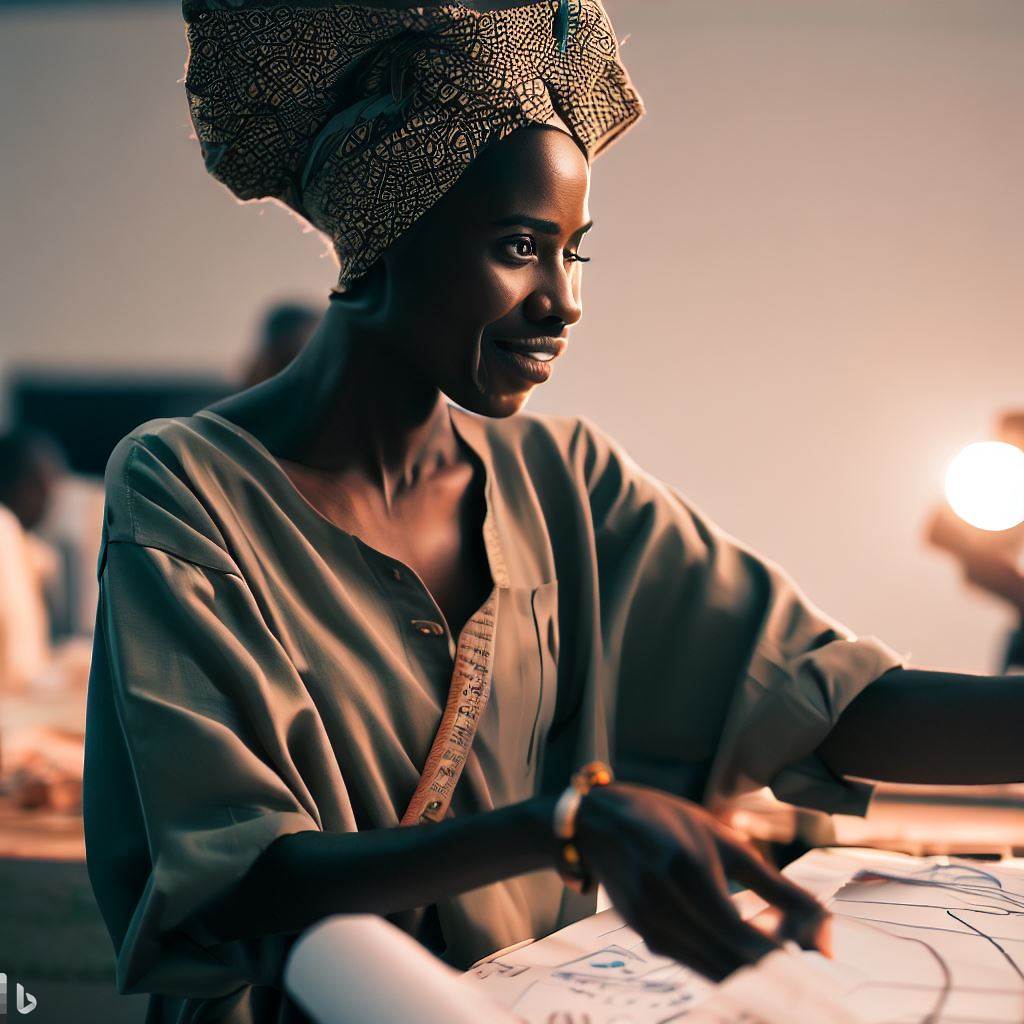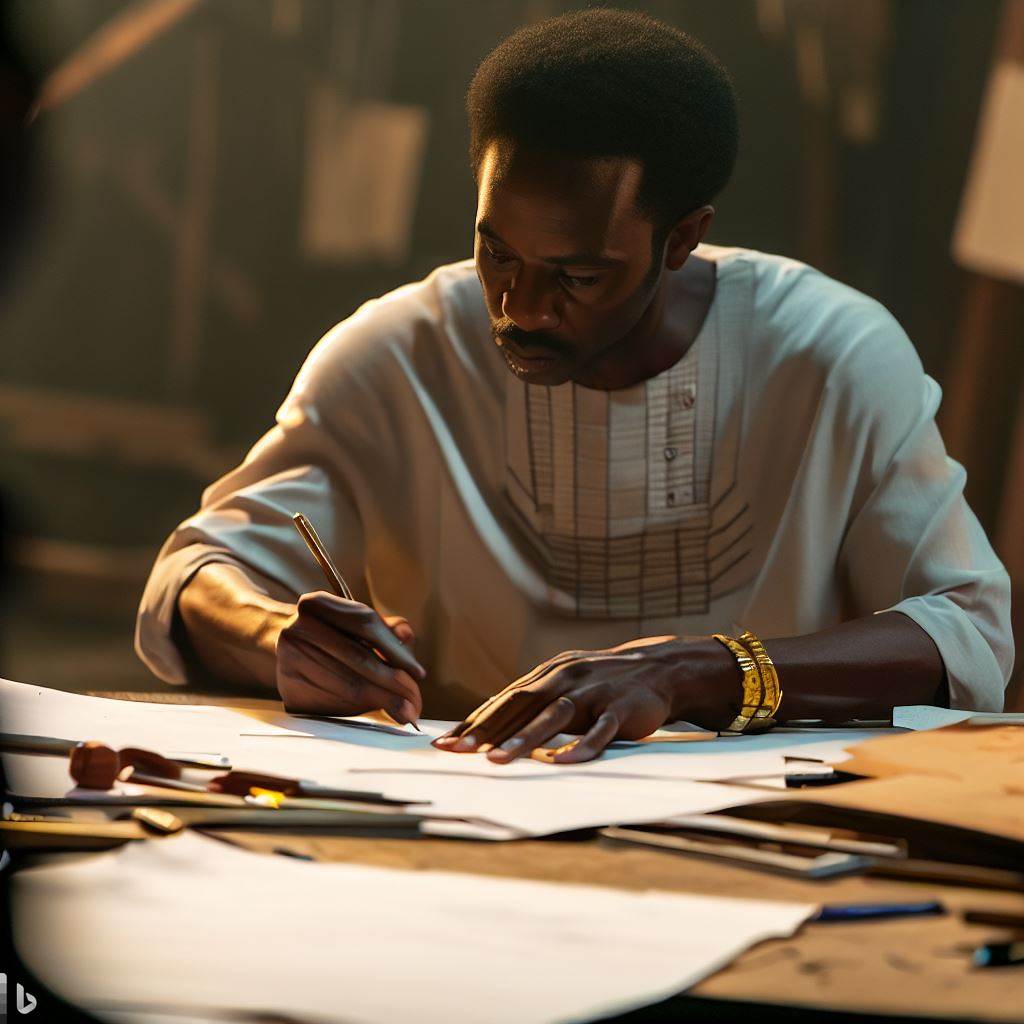Introduction
Fashion design schools can be defined as educational institutions that provide training and education in the field of fashion design.
These schools play a crucial role in shaping aspiring designers in Nigeria by equipping them with the necessary skills and knowledge.
Importance of fashion design schools for aspiring designers in Nigeria
Fashion design schools hold significant importance for aspiring designers in Nigeria.
They serve as platforms for creativity and innovation, allowing individuals to develop their artistic abilities and explore their unique style.
These schools offer a structured curriculum that covers various aspects of fashion design, including pattern-making, garment construction, and fashion business.
Attending a fashion design school also enables students to learn from experienced industry professionals.
These experts provide valuable guidance, mentorship, and critique, helping students refine their skills and enhance their understanding of the fashion industry.
Moreover, these institutions often provide opportunities for internships and industry collaborations, allowing students to gain real-world experience and build their professional networks.
Fashion design schools in Nigeria also foster a sense of community among aspiring designers.
Students collaborate on projects, share ideas, and learn from each other’s diverse perspectives.
This environment encourages creativity and provides a supportive network that can be beneficial throughout their careers.
Basically, fashion design schools in Nigeria play a crucial role in training and nurturing aspiring designers.
They provide comprehensive education, mentorship, and networking opportunities to help individuals develop their skills and succeed in the dynamic world of fashion.
By attending these schools, aspiring designers can realize their creative potential and pave the way for a successful career in the industry.
Overview of the Fashion Design Industry in Nigeria
Fashion design in Nigeria has experienced remarkable growth and development over the years.
Nigerian designers have also made a significant impact on the global fashion stage.
In this section, we will delve into an overview of the fashion design industry in Nigeria, focusing on its growth, development, and the influence of Nigerian designers on the global stage.
Growth and development of the fashion industry in Nigeria
The fashion industry in Nigeria has witnessed a tremendous growth spurt in recent years.
With a population of over 200 million people, the Nigerian market presents a vast consumer base for fashion designers.
This has attracted both local and international fashion brands to establish a presence in the country.
Increased demand for Nigerian fashion designers
Nigerian fashion designers have gained recognition both locally and internationally.
Their unique blend of traditional African aesthetics and contemporary designs has garnered attention from fashion enthusiasts around the world.
This has resulted in a surge in demand for Nigerian fashion designers, who are now highly sought after for their creativity and craftsmanship.
Pioneers and trailblazers in Nigerian fashion design
Several Nigerian fashion designers have paved the way for the industry’s growth and development.
Icons such as Lisa Folawiyo, Deola Sagoe, and Mai Atafo have gained global recognition for their innovative designs and entrepreneurial spirit.
Their success stories have inspired and motivated upcoming designers to pursue careers in fashion design.
Nigerian fashion weeks and events
The fashion scene in Nigeria is vibrant and dynamic, with numerous fashion weeks and events taking place throughout the year.
Lagos Fashion Week, Arise Fashion Week, and GTBank Fashion Weekend are some of the notable platforms that showcase the best of Nigerian fashion.
These events provide designers with opportunities to present their collections, network, and attract investors.
Influence of Nigerian fashion designers on the global stage
Nigerian fashion designers have made their mark on the global stage, contributing to the changing narrative of African fashion.
Their designs have been featured in international fashion magazines, worn by celebrities, and showcased at prestigious fashion shows around the world.
This recognition has helped put Nigerian fashion on the map and challenged stereotypes about African fashion.
Promoting African culture through fashion
Nigerian designers often incorporate traditional African elements into their designs, showcasing the rich cultural heritage of the country.
This fusion of traditional and contemporary styles has captivated the international fashion scene, as it offers a fresh and unique perspective on African fashion.
Boosting the Nigerian economy
The fashion industry contributes significantly to Nigeria’s economy, providing employment opportunities for artisans, tailors, models, and other fashion-related professionals.
The growth of the industry also attracts foreign investments, further stimulating economic growth and development.
Challenges faced by Nigerian fashion designers
Despite the progress made, Nigerian fashion designers still face various challenges.
These include limited access to funding, inadequate infrastructure, and a lack of support from the government.
However, designers and industry stakeholders continue to work towards overcoming these hurdles and building a sustainable fashion ecosystem in Nigeria.
Genrally, the fashion design industry in Nigeria has experienced remarkable growth and development, with Nigerian designers making their mark on the global stage.
Through their innovative designs and fusion of traditional and contemporary styles, they have reshaped the narrative of African fashion.
Despite challenges faced, the industry continues to thrive, contributing to Nigeria’s economy and showcasing the country’s rich cultural heritage.
Read: Fashion Design in Nigeria: A Career with Global Impact
Benefits of Attending Fashion Design Schools in Nigeria
In Nigeria, attending fashion design schools comes with several benefits that can greatly enhance one’s career in the fashion industry.
Below are the top three benefits:
Acquisition of Technical Skills and Knowledge
- Fashion design schools provide students with the opportunity to learn and master technical skills.
- They offer comprehensive training in patternmaking, garment construction, fabric selection, and fashion illustration.
- Students are exposed to different design techniques and are encouraged to explore their creativity.
- They gain a deep understanding of the fashion industry, including trends, history, and cultural influences.
- Through hands-on projects and assignments, students develop a strong foundation in design principles and techniques.
Exposure to Industry Professionals and Networking Opportunities
- Fashion design schools in Nigeria often have strong connections with industry professionals.
- Students have the opportunity to learn directly from experienced designers, stylists, and fashion entrepreneurs.
- Guest lectures, workshops, and industry visits are organized to provide students with real-world insights.
- These interactions allow students to build valuable networks, which can lead to internships and job opportunities.
- Attending fashion design schools also allows students to connect with like-minded individuals who share their passion.
- Collaborative projects and group activities foster teamwork and help develop interpersonal skills.
Access to State-of-the-Art Facilities and Resources
- Fashion design schools invest in state-of-the-art facilities to provide students with a conducive learning environment.
- They are equipped with design studios, sewing laboratories, patternmaking rooms, and CAD (Computer-Aided Design) labs.
- Students have access to industry-standard equipment, such as sewing machines, cutting tables, and mannequins.
- Libraries and resource centers are stocked with a wide range of fashion books, magazines, and digital resources.
- These facilities ensure that students can experiment, practice, and refine their skills using the best resources available.
Essentially, attending fashion design schools in Nigeria can give aspiring designers a competitive edge in the industry.
It equips them with the necessary technical skills, exposes them to industry professionals, and provides access to top-notch facilities.
Choosing the right fashion design school is crucial as it can significantly impact one’s future career prospects.
By opting for a reputable institution, students can maximize the benefits of attending fashion design schools in Nigeria.
Read: Becoming a Fashion Designer in Nigeria: A Beginner’s Guide
Top Fashion Design Schools in Nigeria
In the world of fashion, Nigeria is making its mark as a hub for creative and talented designers.
As a result, there are several top fashion design schools in the country that are renowned for their quality education and training.
Lagos Fashion and Design Academy
Lagos Fashion and Design Academy, also known as LFDA, is one of the leading fashion design schools in Nigeria.
Located in Lagos, the school offers a wide range of programs and courses in fashion design, tailoring, and garment production.
LFDA provides a comprehensive curriculum that covers both the theoretical and practical aspects of fashion design.
Students learn various techniques such as pattern making, sewing, draping, and fashion illustration.
The academy also focuses on developing entrepreneurial skills and provides opportunities for students to showcase their designs at fashion shows and exhibitions.
With state-of-the-art facilities and experienced faculty, LFDA ensures that students receive quality education and hands-on training.
Fashion Designers Association of Nigeria (FADAN) School of Fashion
The Fashion Designers Association of Nigeria (FADAN) School of Fashion is another prominent institution for aspiring fashion designers in Nigeria.
Founded by the renowned designer, Chief Mrs. Funmi Ajila-Ladipo, the school offers various programs and courses in fashion design.
FADAN School of Fashion aims to promote Nigerian fashion and empower designers with essential skills and knowledge.
The curriculum focuses on design principles, garment construction, textile technology, and fashion marketing.
Students at FADAN School of Fashion have the opportunity to learn from industry professionals and experienced designers.
The school also provides internship programs and collaborations with fashion brands to give students practical and real-world experience.
Nobel Afrik Fashion Institute
Nobel Afrik Fashion Institute, located in Abuja, is renowned for its excellence in fashion design education.
The institute offers diploma and certificate programs in fashion design, pattern making, garment construction, and fashion entrepreneurship.
With a curriculum that combines creativity and technical skills, Nobel Afrik Fashion Institute prepares students for a successful career in the fashion industry.
The institute also provides opportunities for students to showcase their designs at fashion events and competitions.
JD Institute of Fashion Technology
JD Institute of Fashion Technology is an international fashion school with a branch in Lagos, Nigeria.
The institute offers comprehensive fashion design programs that cover various aspects of the industry, including design, illustration, pattern making, and styling.
With a focus on practical training, JD Institute of Fashion Technology provides students with opportunities to work on industry projects and internships.
The institute also organizes fashion shows and events to showcase students’ creativity and talent.
Pearl Academy Nigeria
Pearl Academy Nigeria is a renowned institution for fashion design education. With campuses in Lagos and Abuja, the academy offers programs in fashion design, styling, and merchandising.
Pearl Academy Nigeria focuses on providing industry-relevant education and training.
The curriculum includes design development, garment construction techniques, fashion forecasting, and business management in the fashion industry.
Students at Pearl Academy Nigeria have access to state-of-the-art facilities and industry experts as mentors.
The academy also collaborates with fashion brands and organizations to provide internships and career placement opportunities.
In general, aspiring fashion designers in Nigeria have several top-notch fashion design schools to choose from.
These institutions provide comprehensive education and training, preparing students for a successful career in the dynamic world of fashion.
Read: Top 10 Nigerian Fashion Designers You Should Know About
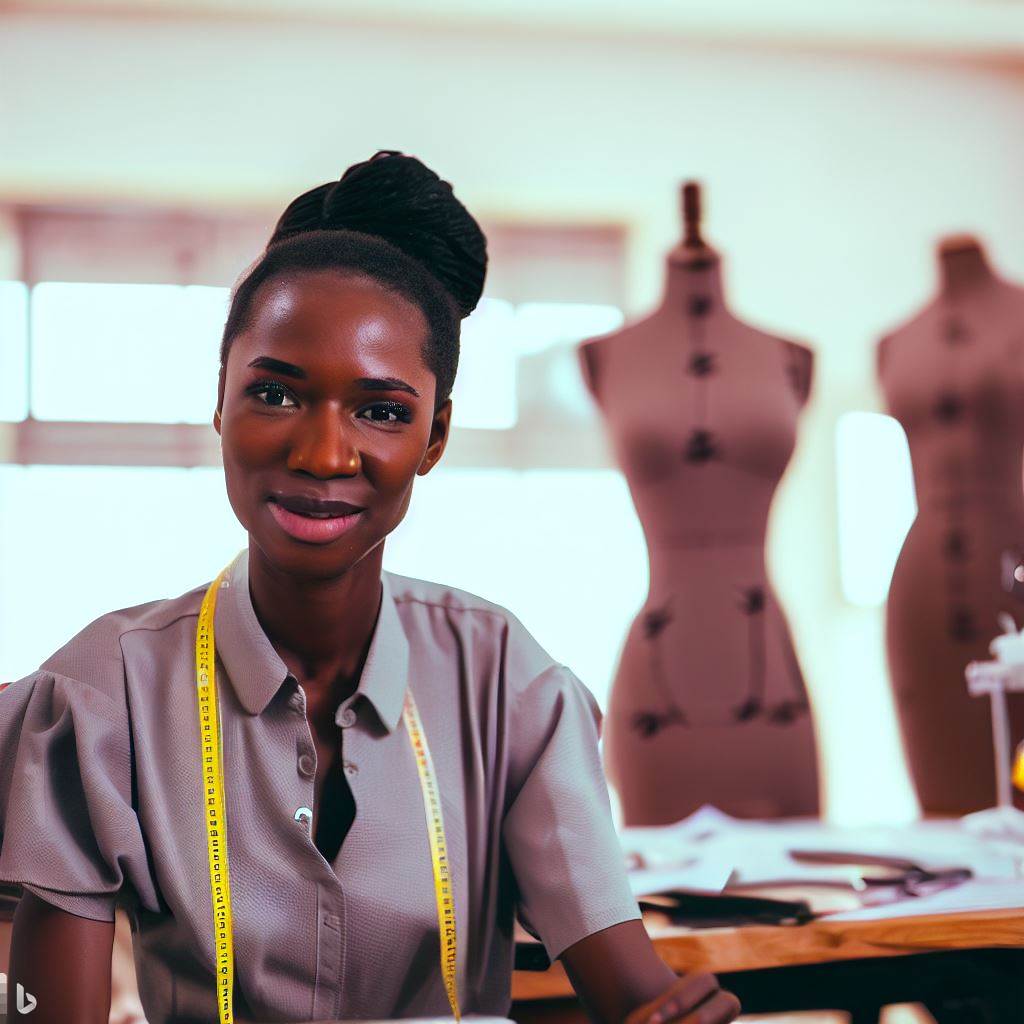
Admission Requirements and Application Process
Admission requirements and application process in fashion design schools in Nigeria can vary, but there are certain common aspects.
Here are some important points to consider:
1. Educational qualifications and prerequisites
To apply for fashion design schools in Nigeria, you generally need to have completed secondary education or its equivalent.
Some schools may also require specific subjects or grades in certain subjects.
2. Portfolio submissions and interviews
Many fashion design schools in Nigeria require applicants to submit a portfolio showcasing their creative and artistic abilities.
This may include sketches, designs, photographs, or any other relevant work.
In addition, some schools may conduct interviews to assess the applicant’s passion, skills, and commitment to the field.
Publish Your Professional Profile, Business or Brand
Showcase your expertise, gain trust, and boost visibility instantly on Professions.ng.
Publish Now3. Tuition fees and financial assistance options
Tuition fees for fashion design schools in Nigeria can vary depending on the institution and program.
It is important to research and compare the fees of different schools before making a decision.
Additionally, some schools offer financial assistance in the form of scholarships, grants, or payment plans to help students manage their educational expenses.
4. Following the Application Process
When applying for admission, it is essential to carefully follow the application process outlined by each school.
Here are the general steps involved:
- Research: Start by researching different fashion design schools in Nigeria to find the ones that align with your interests, goals, and budget. Consider factors like location, curriculum, faculty, facilities, and alumni success.
- Gather required documents: After choosing your desired schools, collect necessary documents like educational certificates, transcripts, ID, photos, and school-specific requirements.
- Prepare your portfolio: Take the time to curate a strong portfolio that showcases your talent, skills, and potential as a fashion designer. Select your best work and make sure it is well-presented and organized. Include a variety of pieces that demonstrate your range and creativity.
- Submit applications: Complete the application forms for the chosen fashion design schools and attach all the required documents, including your portfolio. Pay attention to deadlines and ensure that you submit your applications on time.
- Prepare for interviews: If required, prepare for interviews by researching commonly asked questions and rehearsing your responses. Dress professionally and be confident in showcasing your passion for fashion design.
- Financial planning: Before finalizing your enrollment, carefully consider the tuition fees and financial assistance options available. If needed, research scholarships, grants, or other financial aid programs that can help support your education.
- Await admission decisions: After submitting your application, you will need to wait for the admission decisions from the fashion design schools. This may take a few weeks or months, depending on the institution.
While waiting, you can continue to work on further improving your skills and knowledge in fashion design.
In essence, admission requirements and the application process for fashion design schools in Nigeria involve meeting educational qualifications, submitting a portfolio, and possibly attending interviews.
It is essential to research each school’s requirements, follow the application guidelines, and consider financial assistance options.
By carefully navigating the application process, you can increase your chances of securing admission into a fashion
Read: The Influence of International Trends on Nigerian Design
Curriculum and Programs Offered
When considering fashion design schools in Nigeria, it is essential to assess the curriculum and programs offered.
The courses available should cover a wide range of topics to provide students with a comprehensive understanding of the fashion industry.
- Variety of courses available such as pattern-making, garment construction, textile design, and fashion marketing.
- Duration of programs may vary from certificate, diploma to degree programs.
- Internship opportunities provided to students for practical industry experience.
- Opportunities for industry placements to help students network and gain real-world insights.
Variety of courses available
One of the key factors to look for is the variety of courses available.
A good fashion design school should offer courses in pattern-making, garment construction, textile design, fashion marketing, fashion illustration, fashion history, and more.
These courses provide students with a well-rounded education in all aspects of fashion design.
Duration of the programs offered
Another important aspect to consider is the duration of the programs offered.
Fashion design schools in Nigeria typically offer programs at different levels, including certificate, diploma, and degree programs.
The duration of these programs may vary, with certificate programs lasting a few months to a year, diploma programs lasting two to three years, and degree programs lasting four to five years.
Students should choose a program that aligns with their career goals and time commitment.
Internship opportunities provided
In addition to theoretical knowledge, practical experience is crucial in the field of fashion design.
Internship opportunities provided by fashion design schools can offer students valuable hands-on experience, helping them apply their skills in a real-world setting.
These internships may be with local designers, fashion houses, or industry professionals, allowing students to learn from the best in the business.
Industry placement opportunities
Furthermore, some fashion design schools in Nigeria also provide industry placement opportunities.
These placements enable students to work with renowned fashion companies or participate in industry events.
The experience gained during these placements can give students a competitive advantage and help them establish valuable connections within the fashion industry.
In essence, the curriculum and programs offered by fashion design schools in Nigeria play a significant role in shaping students’ knowledge and skills in the field of fashion design.
It is crucial for aspiring fashion designers to carefully evaluate the variety of courses available, the duration of programs, and the practical opportunities provided such as internships and industry placements.
By choosing a comprehensive and well-rounded program, students can enhance their chances of success in the dynamic world of fashion design.
Success Stories and Notable Alumni
Nigeria’s fashion design schools have produced many talented designers who have made a significant impact in the fashion industry.
Here are some famous Nigerian fashion designers who attended these schools and their notable achievements:
Deola Sagoe
Deola Sagoe studied at the University of Lagos and later attended the famous Yaba College of Technology in Lagos.
She is renowned for her innovative designs, which blend traditional Nigerian fabrics and modern aesthetics.
Sagoe has showcased her collections at prestigious fashion events worldwide and has dressed numerous international celebrities.
Lisa Folawiyo
Lisa Folawiyo, an alumna of the University of Lagos, is known for her label, Jewel by Lisa.
She has gained recognition for her intricate embellishments and use of Ankara fabric, a popular West African textile.
Folawiyo’s designs have been featured in major international publications, and she has collaborated with global brands like J.Crew.
Mai Atafo
Mai Atafo is a well-known Nigerian fashion designer who attended the Fashion Institute of Technology in New York.
He has worked with top fashion brands and has dressed notable celebrities, including Omotola Jalade Ekeinde and Wizkid.
Atafo is also the founder of Mai Atafo Inspired, a label that specializes in bridal wear and bespoke suits.
Lanre Da Silva Ajayi
Lanre Da Silva Ajayi studied fashion design at the University of Lagos. She is recognized for her unique fusion of traditional Nigerian fabrics with contemporary designs.
Ajayi has showcased her collections at various international fashion shows and has dressed influential figures such as Michelle Obama and Oprah Winfrey.
Zizi Cardow
Zizi Cardow is one of Nigeria’s pioneering fashion designers. She attended the American Intercontinental University in London and later launched her label, Zizi, in Lagos.
Cardow’s designs are known for their vibrant colors and African-inspired patterns.
She has received numerous awards for her contributions to the Nigerian fashion industry and has participated in international fashion weeks.
Frank Oshodi
Frank Oshodi, an alumnus of the London Academy of Fashion, is a prominent fashion designer and stylist in Nigeria.
He has dressed various celebrities and has been instrumental in promoting Nigerian fashion internationally.
Oshodi also played a vital role in organizing Nigeria’s first-ever Fashion Week.
Their achievements and impact in the fashion industry
These Nigerian fashion designers have achieved remarkable success and have had a significant impact on the fashion industry both locally and internationally.
They have put Nigerian fashion on the global map and have inspired countless aspiring designers in the country.
Their achievements serve as motivation for current and future students of fashion design schools in Nigeria.
These success stories prove that talent, hard work, and quality education can lead to a successful career in the fashion industry.
Aspiring fashion designers can look up to these notable alumni and learn from their journeys to create their path to success.
The fashion design schools in Nigeria provide the necessary foundation and resources for students to develop their skills and unleash their creative potential.
In short, the success stories of famous Nigerian fashion designers who attended these schools are a testament to the quality of education and training offered.
These designers have not only made their mark in the fashion industry but have also paved the way for the next generation of Nigerian fashion designers.
Challenges and Opportunities for Fashion Design Graduates in Nigeria
When it comes to pursuing a career in fashion design in Nigeria, graduates face both challenges and opportunities.
In this section, we will explore the various obstacles that fashion design graduates encounter, as well as the emerging prospects that the industry offers.
Limited job opportunities and competition
- The fashion design industry in Nigeria is highly competitive, making it challenging for graduates to find employment.
- There is a limited number of established fashion houses and brands that offer job openings for designers.
- Graduates often experience tough competition from other talented individuals vying for the same positions.
- Companies prefer experienced designers, leaving fresh graduates with fewer job options.
Emerging opportunities in the retail sector, fashion shows, and events
- The retail sector has experienced phenomenal growth, opening up opportunities for fashion design graduates.
- Established and emerging retail brands are constantly seeking designers to create unique and marketable collections.
- Fashion shows and events provide a platform for young designers to showcase their talent and attract potential clients.
- Participating in these events helps graduates gain recognition and build a strong portfolio.
Entrepreneurship and self-employment prospects
Due to the challenges of finding employment, many fashion design graduates opt for entrepreneurship and self-employment.
Starting their own fashion label allows graduates to have creative control and pursue their unique design aesthetic.
Platforms like social media and e-commerce have made it easier for graduates to market and sell their creations directly to consumers.
With determination, hard work, and business acumen, graduates can establish successful fashion businesses.
While fashion design graduates in Nigeria face limited job opportunities and fierce competition, there are emerging prospects that offer hope and potential for success.
Through entrepreneurship, graduates can create their own employment and make a mark in the industry.
The growth of the retail sector and the prevalence of fashion shows and events provide avenues for exposure and recognition.
It is important for graduates to stay motivated, continue learning, and take advantage of the available opportunities to overcome the challenges they may face.
With the right mindset and a strong work ethic, fashion design graduates in Nigeria can thrive and carve a successful career path in the dynamic world of fashion.
Conclusion
It is important to recap key points about fashion design schools in Nigeria.
Firstly, these schools offer comprehensive programs that cover various aspects of fashion design.
Secondly, the schools have experienced and skilled faculty members who are passionate about teaching and mentoring.
Thirdly, students have access to well-equipped facilities and resources that enable them to develop their skills and creativity.
Moreover, many fashion design schools in Nigeria have strong industry connections, providing students with networking opportunities and internship placements.
Lastly, pursuing education in reputable fashion design schools in Nigeria can lead to a successful career in the industry.
Therefore, aspiring fashion designers are encouraged to consider these schools for their education and professional growth.
By gaining knowledge and honing their skills in reputable fashion design schools, aspiring designers can pave the way for a successful career in the industry.

